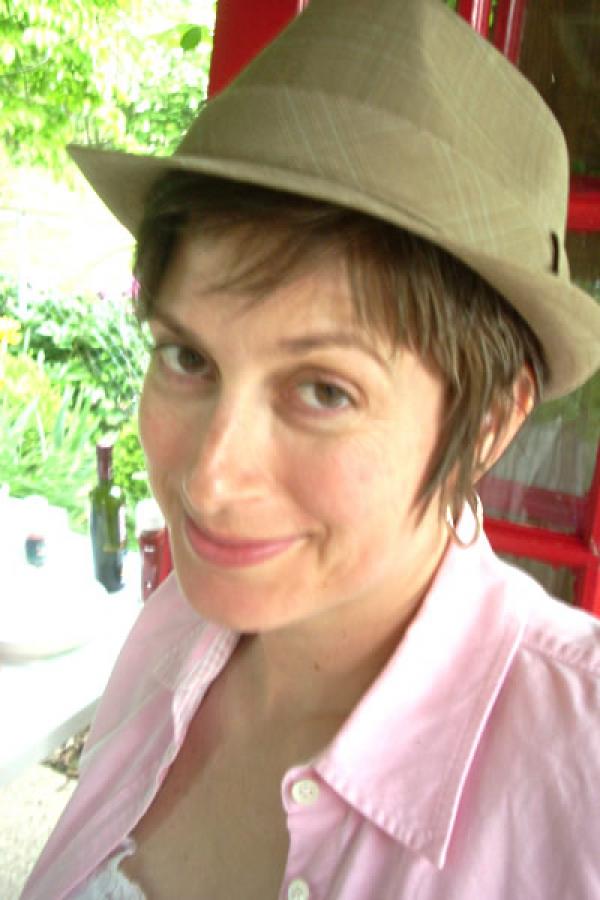Anne O. Fisher

Photograph by Derek Mong
Bio
Anne O. Fisher translated two novels by the Soviet satirical duo Ilya Ilf and Evgeny Petrov, The Twelve Chairs (forthcoming) and The Little Golden Calf (Russian Life Books, 2009). In 2007 she was short-listed for the Rossica translation prize for Ilf and Petrov’s American Road Trip: The 1935 Travelogue of Two Soviet Writers (Cabinet Books and Princeton Architectural Press, 2007). She holds a PhD in Russian Literature from the University of Michigan. She currently lives in San Francisco with her husband Derek Mong, poet and co-translator of Maxim Amelin's work. Mong is the author of Other Romes (Saturnalia Books, 2011) and served as the 2008-2010 Axton Fellow in Poetry at the University of Louisville. His work has appeared in The Southern Review, Kenyon Review, and elsewhere.
Translator's Statement
In his 1981 essay "On Collaborative Translating," Jascha Kessler describes how a truly authoritative translation of a literary text would "be best done by a writer who has learned both languages from the same mother -- as if the writer were imbibing Slavic with the milk from one breast, for instance, and English with the milk from the other breast." This must, of course, be a rare occurrence, which leads Kessler to an alternative method for translating literature: collaborative translation. As dedicated readers of translated poetry, and writers who believe strongly in the exchange of literature across linguistic boundaries, Anne O. Fisher and Derek Mong have adopted Kessler's method to translate the poetry of Maxim Amelin. Necessity here plays its role. Anne is no poet, and Derek speaks little Russian. As such, we both rely on each other's talents to proceed, dividing translation's two labors (reading and writing) between us.
This begins with Anne selecting the poems she admires most from Amelin's work, then producing prose cribs from the verse. She annotates heavily, calling attention to meter, rhyme scheme, hidden or obvious quotations, resonances, references, puns, neologisms, and cultural context. These last two points become particularly important in regards to Amelin, whose wordplay draws frequently on Russian literature, liturgy, and history. Derek then takes up the poem, focusing on sound, concision, imagery, and rhythm. He's aided by a dictionary and the poem -- in Russian and literal English -- to his left and right. Much time is spent establishing the alliterations and rhymes that indicate, right from the start, that you're reading a poem: not just a translation of a poem, but a poem itself. This is particularly important in working with Amelin's lush sonic palette.
This is followed by a final stage where we confer on the product and discuss the relative tradeoffs between sound and sense. As Amelin himself has written: "poetry should be translated by poets," though scholars are invaluable for their "unified concept of the poet being translated." We hope to provide an ideal balance between the two.
"Teach Me To Beseech You" by Maxim Amelin
[translated from Russian]
Teach me to beseech You, O Lord,
till my heart's hot lamp and frostbitten hide
might collide, unleashing me, sweat-damp,
toward You, be it high noon, gloaming, or gloom.
Having smelted me, be sure I succumb
to the fate with which I was stamped.
Without You we're wind-bent walking sticks --
O people! -- pulpy flesh that blankets
decrepit bones, swelled fruit that tumbles
from the tree of life noiselessly -- another
slug's nacreous trail, which glimmers
with pride for a lot in life that's worthless.
As for me, I followed You so imprudently,
like a vessel in search of shore while the sea's
still storming. O Lord, extend your sunbeams
to me -- be unjust, be pitiless;
for the one transformed by a surge of sense
You've the gift of grateful speech. Teach me.
About Maxim Amelin
Born in Kursk in 1970, Maxim Amelin is of the last generation of Russian poets to grow up in the Soviet Union, the "Thirty-year-Olds" or children of perestroika. This label, though, is more generational than aesthetic. A collector of 18th-century neologisms, translator of Catullus and Pindar, and student of Revolutionary word-smithing, Amelin keeps his poetry in suspension through the tension of opposites. This helps him articulate the still transitional world of Russian poetry post-1991. His books have won Russia's most prestigious poetry prizes since first appearing in 1996, though only a dozen of his poems have appeared in English.

